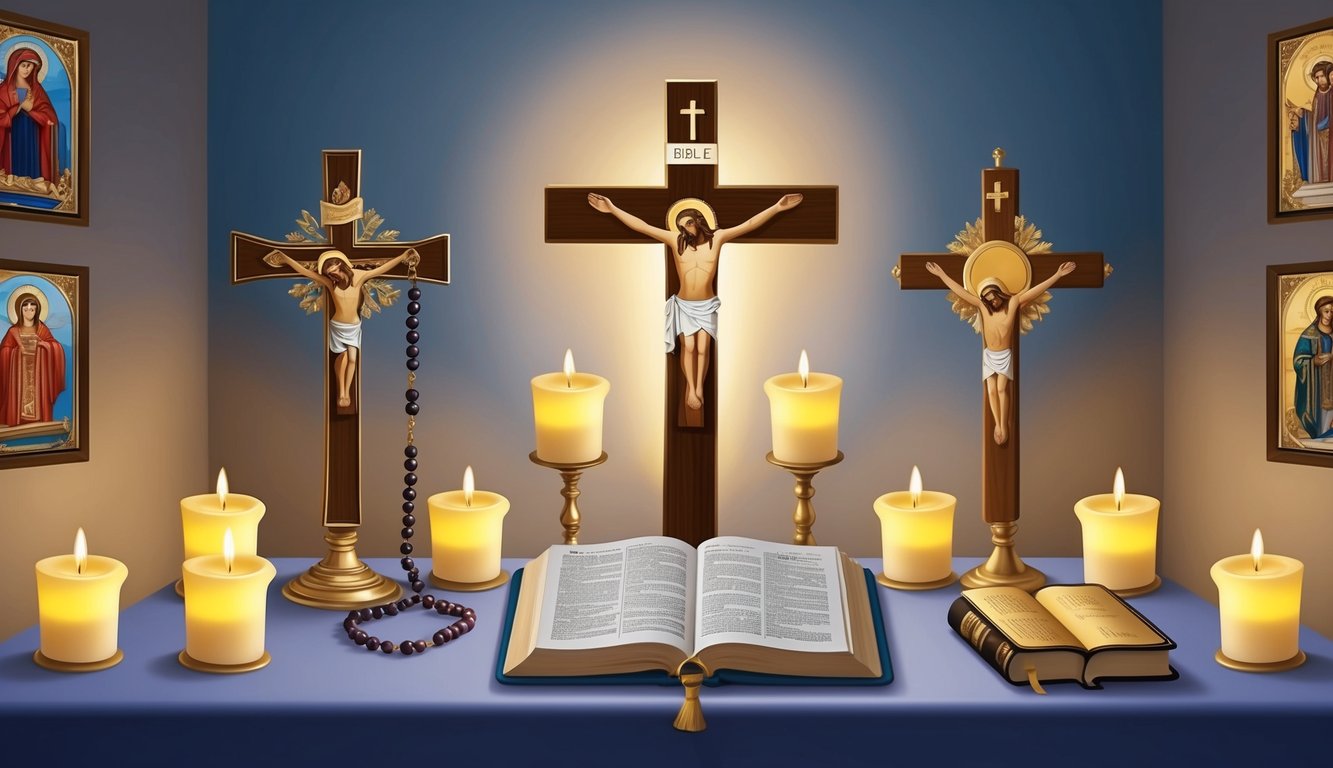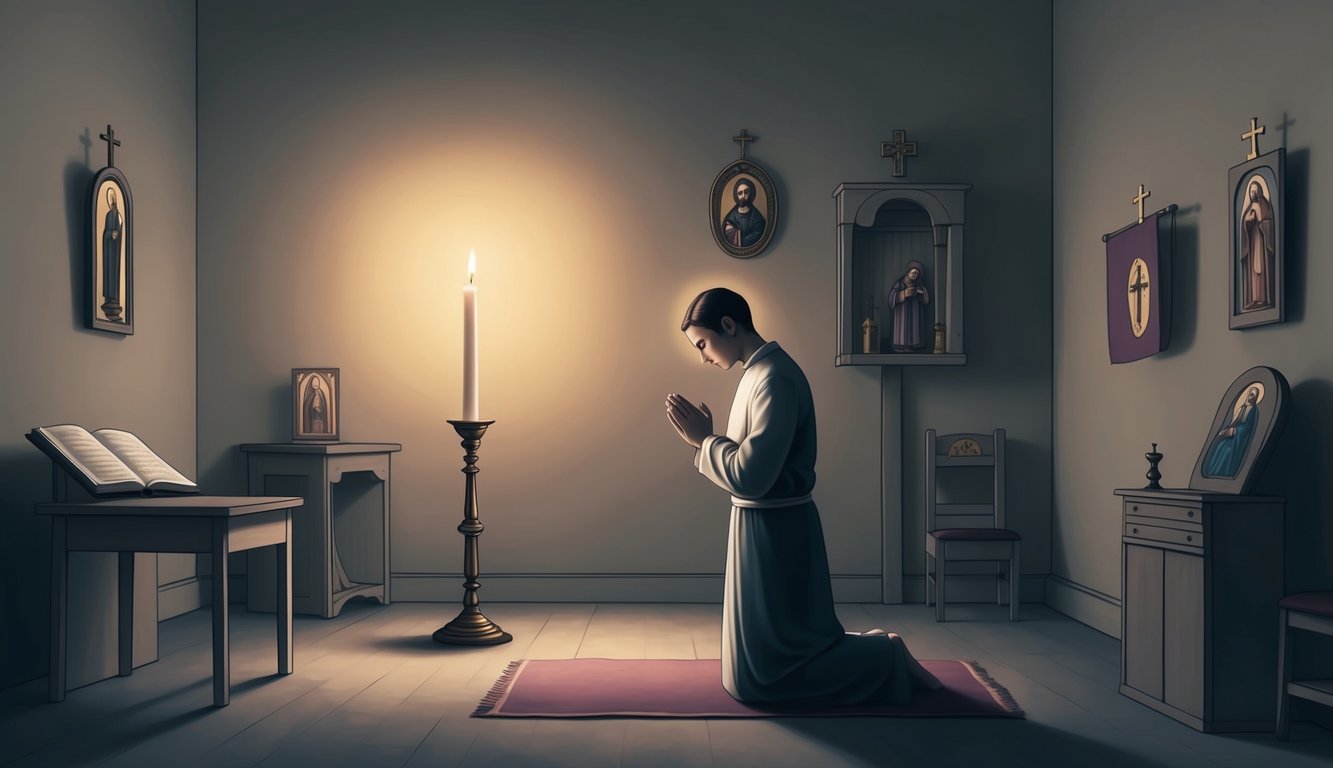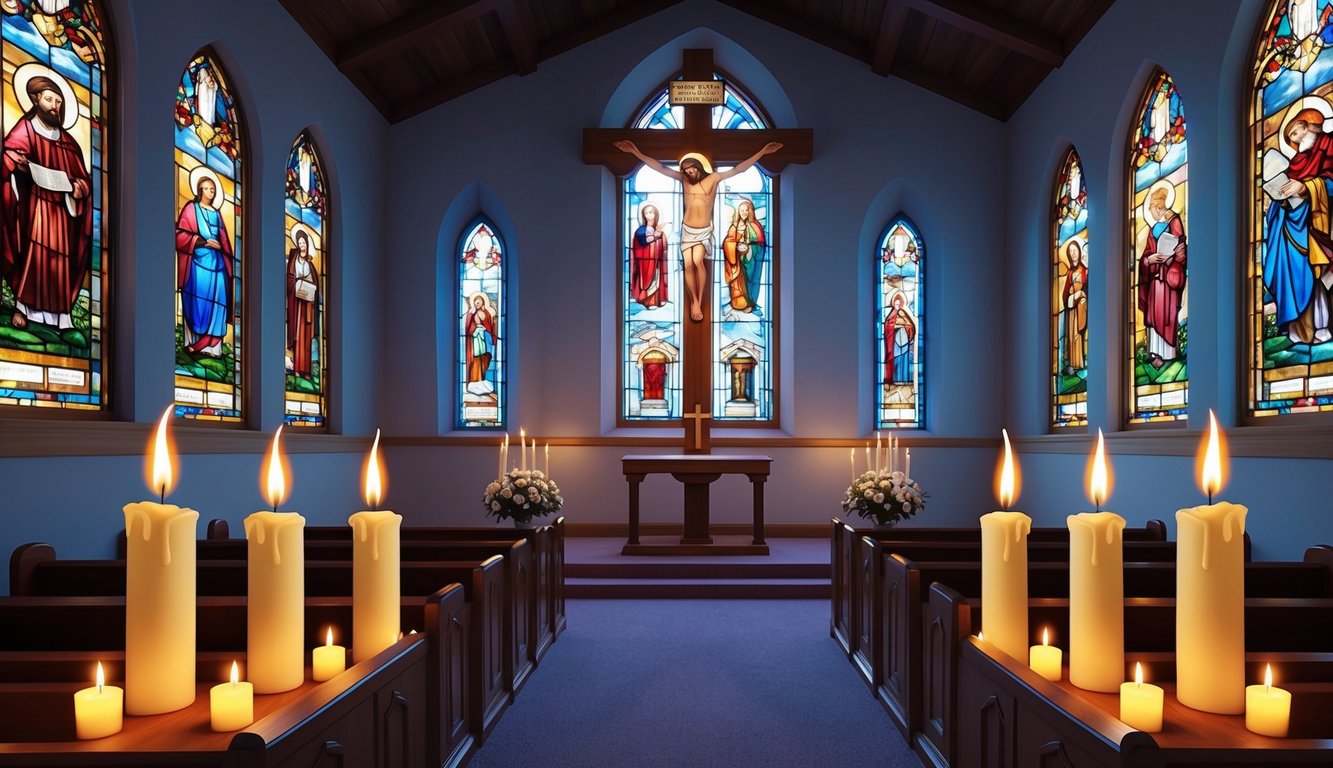Don’t Miss Out On This Unique Astrological Opportunity
Are you tired of spinning your wheels and getting nowhere? Simply put, you’re out of sync: you’re out of alignment with your astral configuration.
But: there’s a kind of map that can help you reclaim your alignment. Think of it as your own personal blueprint to success and happiness: a blueprint that will help you live your most amazing life.
Get started here.
Exploring Catholic spirituality opens a window into a rich tradition that offers deep connection with God, Jesus, and the Holy Spirit.
It’s about more than just rituals or prayers; it’s a way of living that brings you closer to the divine.
Catholic spirituality invites you to find God in everyday life and see the world as a reflection of His love and presence.
As you dive into this spiritual journey, you’ll discover how traditions and teachings of the Church guide you.
They provide a framework to help you grow in love and understanding.
Catholic spirituality emphasizes the importance of community and the interconnectedness of all believers.
This network of faith helps you feel supported and grounded as you navigate your relationship with God.
Catholic spirituality also encourages you to engage deeply with the messages of the Bible and the life of Jesus.
In doing so, you can find inspiration and guidance for your own life.
Through prayer and reflection, you develop a closer bond with Jesus, who serves as a model of love, kindness, and compassion.
Understanding Catholic Spirituality
Catholic spirituality is deeply rooted in a rich history and involves essential beliefs and practices that guide daily life.
You’ll explore how traditions, doctrines, and sacraments intertwine to reflect the love and teachings of Jesus Christ.
Historical Development
Catholic spirituality has evolved significantly over the centuries.
Its roots are deeply embedded in the Judeo-Christian Tradition, drawing from early Christianity’s rich heritage.
Post the teachings of Jesus Christ, the early Church Fathers greatly influenced this development.
The Second Vatican Council renewed the emphasis on engaging the modern world while holding firm to tradition and doctrine.
This meeting emphasized love, community, and deeper theological insights.
As you explore these developments, note how these historical shifts continue to enrich and shape Catholic spiritual life today.
Central Beliefs and Practices
Key elements of Catholic spirituality include a focus on the Gospels, doctrinal teachings, and the role of the Church in guiding spiritual life.
At its core, the focus is on the life and teachings of Jesus Christ, as manifested through the Gospels and Catholic tradition.
Catholic spirituality also emphasizes the importance of prayer, sacraments, and acts of charity as means of growing closer to God.
Central to this spiritual journey is an understanding of the Trinity, including Jesus Christ, God the Father, and the question of who is the Holy Spirit in guiding and inspiring the faithful.
Through these elements, Catholics seek to deepen their faith and live out the message of the Gospel in their daily lives.
Practices such as prayer, meditation, and community gatherings play a vital role.
Guided by the Church, these practices reinforce individual and collective faith journeys.
You’ll often find Catholics engaging in daily prayers, attending Mass, and participating in community services to deepen their spiritual connection and live out their faith through acts of love and charity.
The Role of the Sacraments
Sacraments are central to Catholic spirituality, acting as channels of grace and a means to experience God’s presence.
They serve as milestones in a Catholic’s spiritual journey, ranging from Baptism to Confirmation and the Eucharist.
Each sacrament holds a unique significance, enriching the spiritual life of believers.
Through these sacred rites, the Church underscores elements of the doctrine, emphasizing renewal, faith, and community.
The sacraments offer you a tangible connection to divine grace, strengthening your relationship with God and the broader Catholic community.
You’ll notice their profound impact on personal devotion and communal worship, reinforcing the core values of Catholic spirituality.
Forms of Prayer and Devotion

Catholic spirituality includes various forms of prayer and devotion.
These practices help deepen your relationship with God and nurture your faith.
They range from communal gatherings to individual reflections, each with a unique focus and purpose.
Liturgy and Eucharistic Worship
The liturgy, especially the Mass, is a central form of prayer in Catholic life.
During Mass, you participate in the Eucharist, which is considered the source and summit of Catholic devotion.
The Eucharistic worship is not just a routine but a profound expression of faith, connecting the congregation in a shared act of worship.
Within the liturgy, various prayers, hymns, and rituals guide your spiritual journey.
Each part of the Mass, from the introductory rites to the final blessing, involves prayerful engagement.
It’s a time to reflect on the scriptures and receive spiritual nourishment through the body and blood of Christ.
Private and Communal Prayers
Private prayer allows you to reflect on personal thoughts and seek a deeper connection with God.
This can include meditating on scripture, silent reflection, or reciting favorite prayers.
You might find comfort in practices like the Rosary, which focuses on the life of Jesus and the Virgin Mary through a series of prayers.
Communal prayers often occur in group settings, strengthening the sense of community within the Church.
Participating in these gatherings fosters a shared sense of devotion and upholds the communal aspect of Catholic worship.
Special Devotions and the Rosary
Special devotions include practices centered on specific aspects of faith, saints, or events.
One common form is the Rosary, a popular devotion that involves meditative prayers focusing on key events in the life of Jesus and Mary.
Through these devotions, you can explore different facets of Catholic faith and history.
Whether it is venerating the Virgin Mary or praying for the intercession of saints, these devotions offer a unique way to engage with your spirituality beyond the usual liturgical practices.
They provide a space for both individual reflection and community participation.
Catholic Mysticism and Saints
Catholic mysticism and saints offer a rich tapestry of spiritual practices and teachings.
You can explore the lives of mystics, learn from the wisdom of saints, and see how modern influences shape this spiritual path.
History of Catholic Mystics
Catholic mystics have played a crucial role in spiritual development throughout history.
Mystics such as St. John of the Cross and St. Teresa of Ávila devoted their lives to seeking deeper union with God through prayer and contemplation.
Their writings describe profound experiences that continue to inspire believers today.
Mystics often found themselves at the center of religious reform and debates.
You might be interested in the ways they impacted the Church by pushing spiritual boundaries.
Their mystical experiences provided fresh insights into faith, encouraging followers to deepen their devotion.
Learning from the Saints
The lives of saints offer lessons in faith, compassion, and dedication.
Figures like St. Francis of Assisi, who embraced poverty to serve others, show how living simply can enrich your spiritual life. St. Thomas Aquinas contributed profound theological insights that remain relevant.
Saints challenge you to reflect on your own beliefs and actions.
Their stories encourage you to live with purpose and integrity. St. Dominic, for instance, focused on education and preaching to spread the faith, emphasizing the power of knowledge and truth.
Modern Influences
Today, figures like Thomas Merton bring Catholic mysticism and saintly wisdom into contemporary contexts.
Merton’s reflections on spirituality and social justice resonate with many seeking meaning in a chaotic world.
You can find new approaches to spirituality that blend traditional teachings with modern insights.
This evolution reflects a living tradition, adapting to new challenges while remaining rooted in core principles.
Engaging with these modern influences can enrich your spiritual journey, offering fresh perspectives on living a life of faith.
Spiritual Practices and Asceticism

Catholic spirituality is rich with practices that focus on deepening your connection with God.
These practices include contemplative prayer, monastic traditions, and structured retreats, each offering a unique path to spiritual growth.
Contemplative and Ascetic Traditions
Contemplative traditions invite you to engage deeply with God through silence and prayer. Contemplative prayer is a form of experiencing God’s presence within you, often practiced by those in monasteries. Lectio Divina is another practice where you read and meditate on Bible passages, allowing for personal reflection and insight.
Asceticism, a practice involving self-discipline, helps to strip away distractions, bringing clarity and focus to your spiritual journey.
Monasticism and Religious Orders
Monastic and religious orders have long been a part of Catholic spirituality.
These communities, like the Benedictines and Dominicans, dedicate their lives to prayer, work, and study. Benedictine spirituality emphasizes balance, prayer, and work, while Dominican spirituality focuses on preaching and teaching.
Some choose an eremitic vocation, living in solitude to focus solely on God.
Through these paths, monks and nuns find fulfillment in serving God and the community.
Retreats and Spiritual Exercises
Retreats and spiritual exercises offer concentrated time for spiritual reflection and growth.
These experiences help recharge your faith and bring new insights.
The Spiritual Exercises of St. Ignatius are a well-known retreat method, designed for deepening your relationship with God.
Typically lasting several days, retreats provide structured activities and quiet time to reflect and pray, helping you to return to daily life with renewed purpose and clarity.
Living Catholic Spirituality Today

Living Catholic spirituality today involves embracing the teachings of the Bible and the traditions of Christianity in modern life.
This journey is enriched by community, service, and values, guiding you in daily actions and choices.
The Laity in the Modern World
The laity plays a vital role in the Church’s mission.
Today, many Catholics embrace their faith beyond traditional spaces, engaging in community life and bringing their religious values into the public sphere.
This involvement means living in a way that reflects Christian teachings, such as humility and gratitude.
People like Dorothy Day exemplify how laypersons can impact society through service and action.
Each person’s calling is unique, and you have the opportunity to be a light in the world, creating meaningful change.
Social Justice and Charitable Works
Catholic spirituality often calls you to work towards justice and aid the poor.
Many find inspiration in figures like Dorothy Day, who dedicated her life to helping those in need.
This spiritual path involves both personal transformation and communal action.
Whether volunteering at local shelters or advocating for policy change, the call to serve is an essential aspect of living your faith.
By working together, communities can make a significant impact in addressing issues such as poverty and injustice, promoting a more just and compassionate world.
Integrating Faith in Daily Life
Bringing faith into your everyday life can transform how you interact with others and view the world.
This involves more than attending church on Sundays.
It’s about carrying Christian teachings into every aspect of your life.
Simple acts such as expressing gratitude, showing humility, and acting with kindness serve as daily reminders of your beliefs.
Embracing values from the Bible and your religious tradition helps you make choices that reflect your faith.
Whether at work, school, or home, you integrate spirituality into your routine to live authentically and with purpose.



